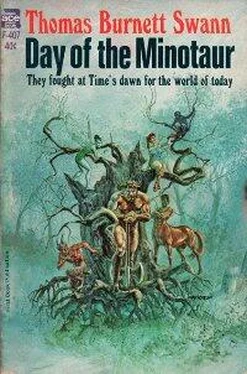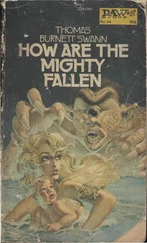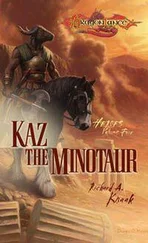Thomas Swann - Day of the Minotaur
Здесь есть возможность читать онлайн «Thomas Swann - Day of the Minotaur» весь текст электронной книги совершенно бесплатно (целиком полную версию без сокращений). В некоторых случаях можно слушать аудио, скачать через торрент в формате fb2 и присутствует краткое содержание. Год выпуска: 1966, Издательство: Ace Books, Жанр: Фэнтези, на английском языке. Описание произведения, (предисловие) а так же отзывы посетителей доступны на портале библиотеки ЛибКат.
- Название:Day of the Minotaur
- Автор:
- Издательство:Ace Books
- Жанр:
- Год:1966
- ISBN:нет данных
- Рейтинг книги:5 / 5. Голосов: 1
-
Избранное:Добавить в избранное
- Отзывы:
-
Ваша оценка:
- 100
- 1
- 2
- 3
- 4
- 5
Day of the Minotaur: краткое содержание, описание и аннотация
Предлагаем к чтению аннотацию, описание, краткое содержание или предисловие (зависит от того, что написал сам автор книги «Day of the Minotaur»). Если вы не нашли необходимую информацию о книге — напишите в комментариях, мы постараемся отыскать её.
Day of the Minotaur — читать онлайн бесплатно полную книгу (весь текст) целиком
Ниже представлен текст книги, разбитый по страницам. Система сохранения места последней прочитанной страницы, позволяет с удобством читать онлайн бесплатно книгу «Day of the Minotaur», без необходимости каждый раз заново искать на чём Вы остановились. Поставьте закладку, и сможете в любой момент перейти на страницу, на которой закончили чтение.
Интервал:
Закладка:
“Those poor Centaurs,” said Icarus when we had left our trees and met to whisper plans. “And the blue monkeys. How do you think the Achaeans got them?” It was the lingering child in him which lamented the Centaurs and the monkeys with the same grief.
“They are trusting creatures. Ajax may have lured them right into the town with the offers of food. Or maybe they followed Thea.”
“I wish we could enter the town as easily as the monkeys.”
I deliberated. “Perhaps we can send a weapon even if we can’t go ourselves.”
“A secret weapon?” The harmamaxa had fascinated him. But the weapon I had in mind was less obvious and much more devilish.
“Remember my telling you about our war with the wolves and how Chiron thought of feeding them wolf’s-bane? It’s a rather innocuous looking root, a bit like a dark carrot. But the monkeys love roots of all kinds. If we could get them to eat wolf’s-bane, and drive them toward the town before they died—”
“The Achaeans would eat them, but Thea wouldn’t. They would poison themselves!”
“Exactly.”
“Is the poison always fatal?”
“When taken in sufficient quantities. Smaller quantities act like a sedative. Either way, the enemy would be knocked out long enough for us to release the captives and take the town.”
We spent the night in my cave, sitting back to back and sharing each other’s warmth in the damp, cold air: friend and friend, remembering what we had lost; warrior and warrior, plotting tomorrow’s vengeance and what we hoped to win:
Icarus said at last: “Eunostos, I am cold all over except for my back,” and I cradled him in my arms until he slept. He had no wish to remain a child, but it pleased him for the moment to relax from the stance of a warrior into the old childish ways of need and dependence, and it pleased his friend to father and shield him. It is one of the ways of love to delight in the youngness, the littleness, the helplessness of the beloved.
When the sun crept yellow feelers into the cave, we went to look for wolf’s-bane. The plant had never thrived on temperate Crete. Its favorite habitat is the cold northern mountains of the mainland, where the sun is a sometime visitor instead of a king.
“Perdix will help us,” Icarus announced. “A snake should know about roots of all kinds. He lives among them.” He drew the snake from his pouch and addressed him with tenderness. “Don’t you, Perdix?”
“Does he understand the word ‘wolf’s-bane’?”
“It explains itself, doesn’t it?” To the snake he said with great emphasis: “WOLF’S-BANE. ROOTS TO KILL A WOLF.”
The tongue flickered with what I presumed to be comprehension and perhaps a touch of petulance because Icarus spoke to him as if he had no tongue to catch the vibrations of human speech. Icarus stooped to release him and, before he could touch the ground, the snake escaped from his fingers. We hurried to follow him through the undergrowth.
“I think he’s after a female,” I whispered when the sweat of the chase had begun to mat my hair.
“He’s doing his bit for Thea. After all, she’s his great-great-niece. Though,” he admitted, “I expect he loves me best. I’ve never stepped on his tail.”
Possessed of a tail myself (though its altitude preserves it from treading sandals), I could understand the snake’s preference.
In less than an hour, he led us to the ragged and unscalable cliff which formed the eastern boundary of the forest. In the shadow of the cliff and the further shade of a large carob tree, we found a clump of wolf’s-bane. Like their four-legged namesake, the plants prefer shadows to sunlight. I knew that in late summer they would burst into showy but somewhat sinister hooded flowers, like visored helmets, of blue, yellow, purple, or white; now, however, leaves like slender, tapering hands. We pulled them up by their stalks and shook the dirt from their thick, tuberous roots. They did not look appetizing, but neither does a carrot, a raw fish, or a plucked chicken.
It was not hard to find a congregation of blue monkeys, the happiest of animals and perhaps the most talkative. You can hear that chattering from a great distance, a multitude of cries which merge their separate sharpnesses into a single music. Merry, trusting, affectionate, they recognized Icarus and me as familiar faces and, at the same time, spied the bait in our hands. One of them jumped on my shoulders and, twining his legs around my neck, bent to clutch at a root. I made a soft chattering which I supposed to approximate monkey and gestured toward the town of the Centaurs, as if to say that I would feed him when we reached the town.
I looked at Icarus and saw the tears in his eyes. “We’re killing them for Thea,” I reminded him. “To save her from those ruffians.”
“I know,” he said, “but treachery is still treacherous. Otherwise, why are you crying?”
“I’m not crying,” I snapped so sharply that the monkey jumped from my shoulder. “I’m trying to comfort you.”
“You’re always trying to comfort someone—Thea, Pandia, me—and doing very well at it. In fact, you’re the most comfortable person I know. But sometimes you need comforting too. I think you ought to marry Thea as soon as you rescue her.”
He did not doubt that we would be successful or that, once rescued, she would wish to marry me. To be admired by such a boy—well, it made me want to reach and aspire until my heart more nearly equaled my height.
The monkeys followed us in a long, vociferous stream, and I earnestly hoped that no Achaeans would issue from the trees to contest our advance. Once, a Dryad called to us from her bower, her face poised in the branches like a water lily in a green pool. In the past she had always scorned me, but now she called in a husky whisper:
“Eunostos, take care of yourself. The forest depends on you.”
At the edge of the forest, still under cover of trees, we fed the monkeys. With a touching but not entirely successful attempt to avoid biting or scratching us, they plucked the roots from our hands and ate them so quickly that they did not have time to notice their bitterness. Then we waved our daggers and ran at the unsuspecting creatures with a show of great ferocity. At first they mistook our actions for a game and tried to wrestle the knives out of our hands. We had to strike them with the flats of our blades to prove our hostility. I shall never forget their cries of astonishment and disbelief. We watched them vaulting across the trellises of the vineyard, still in a pack and more aggrieved than frightened.
We could not follow them into the fields by daylight, but Icarus, climbing another tree, witnessed the meeting between the monkeys and the Achaeans, who heard their arrival and came from the compound to investigate. Already the monkeys were growing sluggish with the poison, which strikes painlessly but with first a tingling and then a deadening of all sensations, and the men dispatched them with swords and returned to the compound. The Achaeans, who were not acquainted with the monkeys’ usual vigor, had no reason to suspect their condition. They received the congratulations of their friends on a good catch; they paused; they seemed to deliberate, no doubt asking themselves if they ought to share their prize with those in the town. Generosity or fear of Ajax provided the answer, and selecting the plumpest to keep in the compound, they strung the remaining bodies on a rope and headed for the town.
When the absence which is night had made our presence reasonably undiscoverable, we crossed the fields and, encountering no patrols, resumed our vantage points in the trees beside the moat. Two bonfires writhed in the darkness, like orange squids in the lightless depths of the sea: one in the theater, one in the compound. It was the many-tentacled fire in the theater which held my attention.
Читать дальшеИнтервал:
Закладка:
Похожие книги на «Day of the Minotaur»
Представляем Вашему вниманию похожие книги на «Day of the Minotaur» списком для выбора. Мы отобрали схожую по названию и смыслу литературу в надежде предоставить читателям больше вариантов отыскать новые, интересные, ещё непрочитанные произведения.
Обсуждение, отзывы о книге «Day of the Minotaur» и просто собственные мнения читателей. Оставьте ваши комментарии, напишите, что Вы думаете о произведении, его смысле или главных героях. Укажите что конкретно понравилось, а что нет, и почему Вы так считаете.












